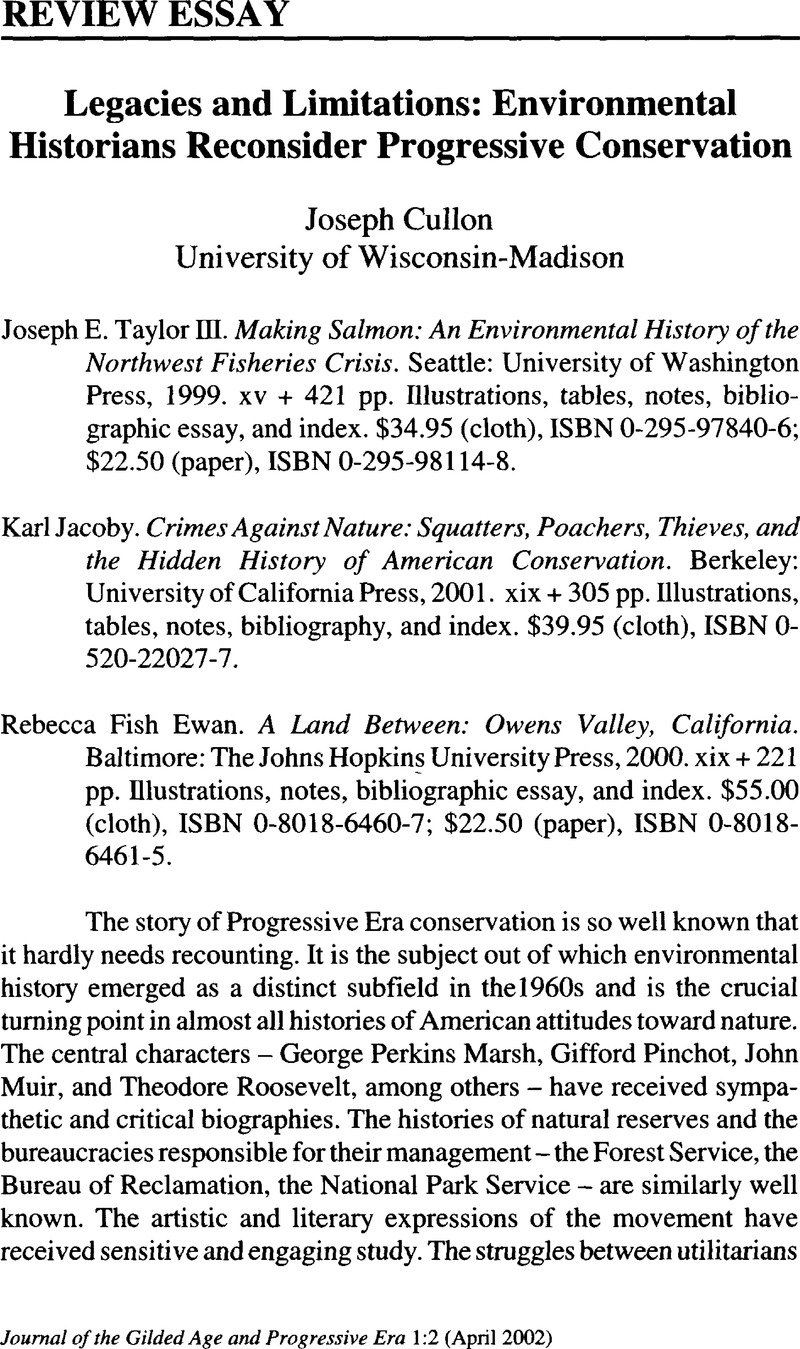Article contents
Legacies and Limitations: Environmental Historians Reconsider Progressive Conservation
Review products
Published online by Cambridge University Press: 08 November 2010
Abstract

- Type
- Review Essay
- Information
- Copyright
- Copyright © Society for Historians of the Gilded Age and Progressive Era 2002
References
1 For a comprehensive overview of Progressive conservation see Koppes, Clayton R., “Efficiency/Equity/Esthetics: Towards a Reinterpretation of American Conservation,” Environmental Review 11 (Summer 1987): 127–46.Google Scholar It is usefully read alongside Rodgers, Daniel T., “In Search of Progressivism,” Reviews in American History 10 (December 1982): 113–32CrossRefGoogle Scholar and White, Richard, “American Environmental History: The Development of a New Historical Field,” Pacific Historical Review 54 (1985): 297–335.CrossRefGoogle Scholar
2 Lowenthal's, DavidGeorge Perkins Marsh: Versatile Vermonter (New York, 1958)Google Scholar has been revised and reissued as George Perkins Marsh: Prophet of Conservation (Seattle, 2000).
3 For overviews of recent changes in scientific constructions of nature see Botkin, Daniel, Discordant Harmonies: A New Ecology for the Twenty-First Century (New York, 1990)Google Scholar and Worster, Donald, “The Ecology of Order and Chaos,” in The Wealth of Nature: Environmental History and the Ecological Imagination (New York, 1993), 156–70.Google Scholar
4 Attending to nature and culture as inextricably linked is fundamental to the practice of environmental history. See Worster, Donald, et al, “A Roundtable: Environmental History,” Journal of American History 76 (March 1990): 1087–1147CrossRefGoogle Scholar and Cronon, William, ed., Uncommon Ground: Toward Reinventing Nature (New York, 1995).Google Scholar
5 For an especially engaging study of the impact of scientific management on the forests of the Blue Mountains, which nicely complements Taylor's work, see Langston, Nancy, Forest Dreams, Forest Nightmares: The Paradox of Old Growth in the Inland West (Seattle, 1995).Google Scholar
6 Spence, Mark David, Dispossessing the Wilderness: Indian Removal and the Making of the National Parks (New York, 1999).Google Scholar
7 Judd, Richard, Common Lands, Common People: The Origins of Conservation in Northern New England (Cambridge, MA, 1997)Google Scholar and Warren, Louis, The Hunter's Game: Poachers and Conservationists in Twentieth-Century America (New Haven, 1997), 49.Google Scholar
8 Kahrl, William L., Water and Power: The Conflict over Los Angeles' Water Supply in the Owens Valley (Berkeley, 1982)Google Scholar; Worster, Donald, Rivers of Empire: Water, Aridity, and the Growth of the American West (New York, 1985)Google Scholar; and Walton, John, Western Times and Water Wars: State, Culture, and Rebellion in California (Berkeley, 1992).Google Scholar On the California landscape more generally, see Smith, Michael L., Pacific Visions: California Scientists and the Environment, 1850–1915 (New Haven, 1987).Google Scholar
9 Jackson, John Brinckerhoff, The Necessity for Ruins and Other Topics (Amherst, MA, 1980)Google Scholar and A Sense of Place, a Sense of Time (New Haven, 1994).
- 1
- Cited by


